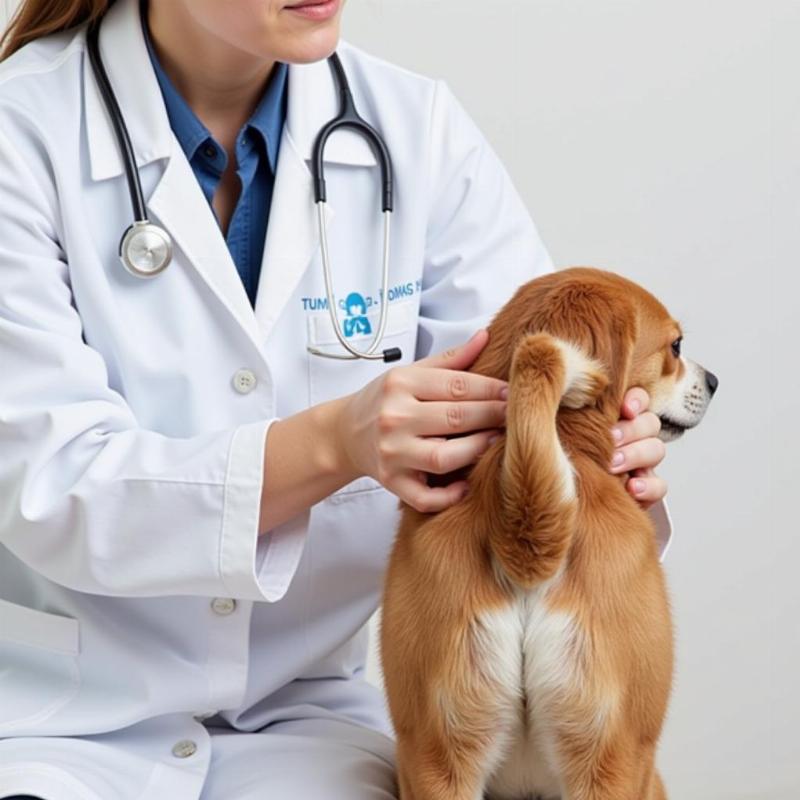Anal gland issues are a common, and often smelly, problem for dogs. While a vet trip might be necessary in some cases, many dog owners prefer to explore natural ways to help their furry friends express their anal glands at home. This article will delve into the causes, signs, and natural solutions for dog anal gland problems, providing you with the tools and knowledge to help your dog find relief.
Understanding Your Dog’s Anal Glands
Dogs have two small sacs located on either side of their anus, aptly named anal glands. These glands secrete a foul-smelling fluid that typically expresses naturally during bowel movements. However, sometimes this natural expression doesn’t happen, leading to discomfort and potential health issues.
Signs Your Dog Needs Anal Gland Expression
How can you tell if your dog is experiencing anal gland problems? Look out for these common signs:
- Scooting: Dragging their rear end across the floor. This is often the most noticeable sign.
- Excessive Licking: Constantly licking or biting at their anal area.
- Discomfort: Whining, yelping, or showing signs of pain when sitting or defecating.
- Foul Odor: A strong, fishy, or unpleasant smell emanating from the rear end.
Natural Methods for Anal Gland Expression
Several natural approaches can help your dog express their anal glands at home. It’s important to remember that while these methods can be effective, consulting a veterinarian is crucial if the problem persists or worsens.
Dietary Changes: Adding Fiber
One of the most effective ways to encourage natural anal gland expression is by increasing fiber in your dog’s diet. Fiber adds bulk to the stool, putting pressure on the anal glands during bowel movements and facilitating natural expression. Adding pumpkin puree, sweet potato, or increasing the fiber content of your dog’s commercial food can make a significant difference.
Hydration is Key
Ensuring your dog drinks plenty of water can also help with anal gland expression. Adequate hydration helps soften the stool, making it easier to pass and promoting natural gland emptying.
Exercise and Movement
Regular exercise can also contribute to healthy anal gland function. Physical activity helps stimulate bowel movements and supports overall digestive health.
Warm Compresses
Applying a warm compress to the anal area can help soothe discomfort and potentially soften impacted secretions. Soak a clean cloth in warm water, wring it out, and gently hold it against your dog’s anus for 5-10 minutes.
When to Consult a Veterinarian
While natural methods can be effective, it’s essential to seek professional veterinary advice if:
- Your dog’s anal gland problems persist despite trying natural remedies.
- Your dog exhibits signs of pain or infection.
- You notice swelling, redness, or discharge from the anal area.
 Veterinarian examining a dog.
Veterinarian examining a dog.
Conclusion
Dealing with dog anal gland issues can be challenging, but understanding the causes and utilizing natural methods can often provide relief. By focusing on diet, hydration, exercise, and warm compresses, you can support your dog’s anal gland health and minimize discomfort. Remember, consulting with your veterinarian is always recommended for persistent or worsening symptoms to ensure your furry friend receives the appropriate care. how can i help my dog express his glands naturally can provide further information on this topic.
FAQ
- How often should a dog’s anal glands express naturally? Typically, anal glands express with each bowel movement.
- Can certain breeds be more prone to anal gland problems? Yes, smaller breeds tend to be more susceptible.
- Is a foul odor always a sign of impacted anal glands? While a fishy smell is a common indicator, other issues can also cause odor.
- Can I express my dog’s anal glands myself? It’s best to leave this procedure to a veterinarian or professional groomer, as improper technique can cause harm.
- Are there any long-term solutions for chronic anal gland problems? In severe cases, surgical removal of the anal glands might be necessary, but this is typically a last resort.
- Can allergies contribute to anal gland problems? Yes, allergies can cause inflammation and contribute to anal gland issues.
- What should I feed my dog for healthy anal glands? A high-fiber diet is essential for promoting natural anal gland expression.
Related Articles
- Home remedies for dog itchy bum
- Best dog food for smelly dogs
- Natural treatment for dog false pregnancy
- How to soothe dog irritated anus naturally
Beautdogs.us is your premier online destination for all things dog-related in the US. We offer expert advice on dog breeds, grooming, nutrition, and overall wellness, catering to both novice and experienced dog owners. Our comprehensive resources help you navigate the joys and challenges of dog ownership. For personalized support and guidance, reach out to our team of experts. Email: [email protected], Phone: +1 501-555-7529. Visit Beautdogs.us for more information.